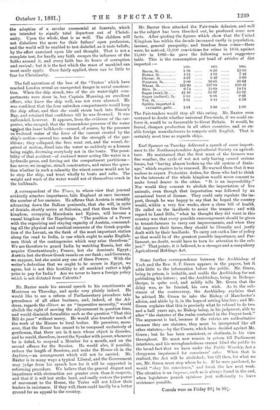Some further correspondence between the Archbishop of York and the
Rev. S. F. Green appears in the papers, but it adds little to the information before the public. Mr. Green, being in prison, is irritable, and scolds the Archbishop for not publishing his letters ; and the Archbishop, being in Bishops- thorpe, is quite cool, and mildly tells Mr. Green that the delay was, as he fancied, his own wish. As to the sub- stance of the controversy, the Archbishop explains that he advised Mr. Green to take the Bishop of Manchester's advice, and abide by it, in the hope of setting him free ; and Mr. Green explains that this is precisely what he refused to do two and a half years ago, no Bishop being, in his judgment, able to alter "the statutes of the realm contained in the Prayer-book." The argument is bad, because if the rubrics are authoritative because they are statutes, they must be interpreted like all other statutes,—by the Courts, which have decided against Mr. Green ; but he has been consistent, or obstinate, in his view throughout. He must now remain in prison till Parliament interferes, and his wrongheadedness cannot blind the public to the broad fact that we have under the Public Worship Act a clergyman imprisoned for conscience' sake. When that is realised, the Act will be abolished ; but till then, for what we see, Mr. Green must stop where he is. If be were pardoned, he would "obey his conscience," and break the law next week. The situation is an impasse, such as is always found in the end, when legislators punish opinions just sufficiently to leave resistance possible.






























 Previous page
Previous page